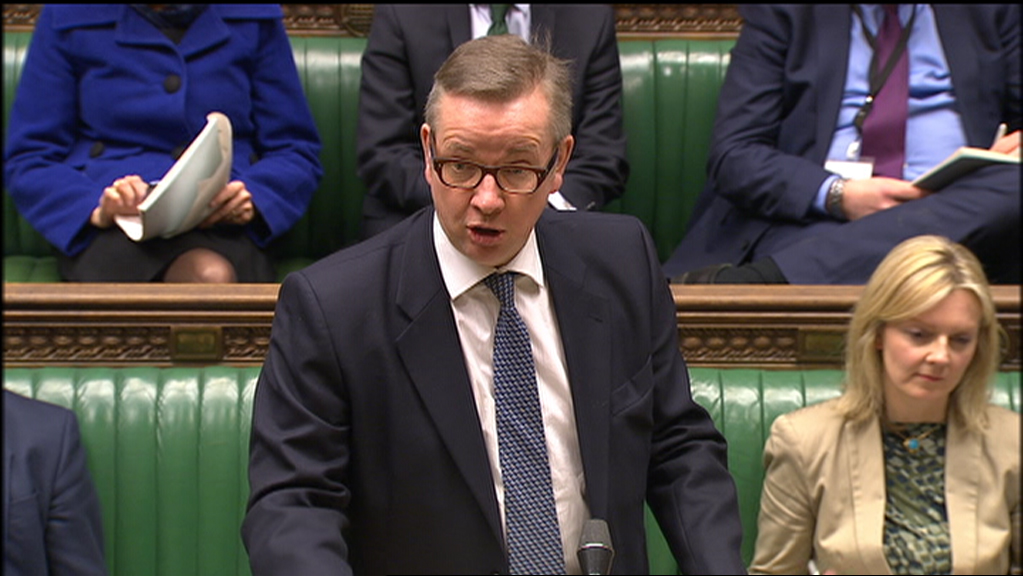A day af ter staging a political ambush that reshaped the race to be Britain’s next prime minister, Michael Gove said Friday he acted out of “conviction, not ambition” to open yet another head-spinning drama amid the fallout from Britain’s snub of the European Union.
The justice minister spoke at length for the first time about his vision for the country he intends to lead, a week after Britain was plunged into chaos by a vote to exit the E.U. that Gove had championed.
The referendum result prompted Prime Minister David Cameron to announce plans to resign by September. Gove initially signaled he would back a former London mayor, Boris Johnson, as Cameron’s replacement.
But just hours before Johnson was to announce his bid for the job, Gove on Thursday launched his own campaign. Johnson withdrew less than three hours later to add another word to Britain’s increasingly dark political lexicon: “Brexecution.”
Gove insisted on Friday that he did not want to be prime minister but felt he had no choice after concluding that Johnson — as bombastic as Gove is wonkish — was not up to the job. The 48-year-old Gove also acknowledged his own shortcomings, saying that “whatever charisma is, I don’t have it.”
The betrayal has scrambled an already chaotic picture in British politics. Gove and Theresa May, who leads the country’s domestic security operations as home affairs minister, are now considered the front-runners to replace Cameron.
Gove’s move against Johnson left Britain reckoning with one more betrayal in a political season full of them. It rattled an already dazed nation, and left no doubt — if any remained — that Britain is divided, directionless and leaderless as it prepares for a leap into the unknown of life outside the European Union.
Gove now must rebuild his image to win over voters stung by his Machiavellian moves, and make a case for how he will negotiate the best terms for Britain as it breaks ranks with the other 27 E.U. nations.
On Friday, he laid out what he described as a radical vision for the country’s future once it leaves the European Union — a process popularly known as Brexit.
“This country voted for change, and I can deliver it,” he said, ticking off his accomplishments in reforming the country’s prison and education systems.
Gove said he was particularly driven to reduce immigration levels, which he described as the clear will of the British people.
May has also said she will reduce immigration through bargaining with the E.U. But in her own announcement of her candidacy on Thursday, she suggested she will bring more continuity than change.
May would be the second female prime minister in British history, after Margaret Thatcher. May’s unsmiling public persona and hard-line conservative politics have drawn occasional comparisons to the Iron Lady.
Much of the response Friday to Gove’s last-minute announcement that he would challenge Johnson was unfavorable.
A succession of leading Conservative politicians threw their weight behind May. So did the Daily Mail, Britain’s rabidly anti-E.U. tabloid. The endorsement came despite the fact that May backed the “remain” campaign. Gove’s wife, Sarah Vine, is a Daily Mail columnist.
“A party in flames and why it must be Theresa,” was the paper’s banner headline Friday.
The Sun, another top-selling British tabloid, used a picture of Johnson on its cover with the word “Brexecuted” underneath.
Johnson, the mop-headed rogue who had been considered the odds-on favorite to take the keys to 10 Downing Street, was shunted to the sidelines of the contest to lead the Conservative Party and, by extension, the nation.
The narrowing of the field of likely winners to Gove and May leaves behind two candidates who are expected to drive an especially hard bargain with the E.U., meaning the country could be in for years of contentious and costly negotiations no matter who emerges as leader.
Gove’s decision to ambush Johnson brought immediate recriminations from both men’s corners on Thursday. Asked by the BBC about Gove, Johnson’s father, Stanley Johnson, replied: “ ‘Et tu, Brute’ is my comment on that.”
Gove backer Dominic Raab told the network that Johnson had been “cavalier” in his approach to the campaign. “We’re picking a prime minister here to lead the country, not a school prefect,” he said acidly.
Britain’s next prime minister will not be picked by the public. Instead, he or she will be selected in a two-stage process within the governing Conservative Party. First, the party’s members of Parliament will whittle the field down to two over the next two weeks. Then the party’s rank-and-file members will select the winner.
In addition to Gove and May, three other candidates were nominated Thursday: Stephen Crabb, Liam Fox and Andrea Leadsom. All are considered long shots.
Cameron has said he will not formally trigger Britain’s exit and will leave that task to his successor. Once that happens, the next prime minister will have two years to negotiate a new deal with the European Union.
Europe has already signaled that it will refuse to budge on likely British demands that the bloc relax its rules requiring freedom of movement for workers across national borders. European leaders say that if Britain wants access to the single market, it will have to accept free movement.
Britain’s political unrest has not been limited to the Conservatives.
The internal warfare among Tories has been matched — and even exceeded — within the opposition Labour Party.
Pressure continued to build Friday on party leader Jeremy Corbyn to resign after what was seen as an ambivalent effort to rally party supporters to the pro-E.U. cause.
He has already suffered an overwhelming vote of no confidence among his Labour colleagues in Parliament, and he has faced additional defections each day this week.































